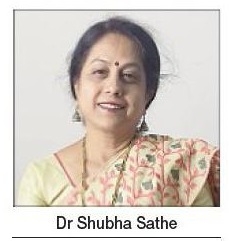‘Vinayak Damodar Savarkar has become a thought’
| Date :28-May-2023 |

By Vikas Vaidya :
“VINAYAK Damodar
Savarkar is not just a
person, he has become a
thought. We should look at
the literature of Savarkar,
his philosophy as a thought
that would guide the
nation. Even after five
decades of his demise, the
society has failed to understand him,” asserted Dr
Shubha Sathe, researcher of
Savarkar literature. Nation
is celebrating the birth centenary of great leader
Swatantryaveer Vinayak
Damodar Savarkar on
Sunday. In the wake of it,
‘The Hitavada’ spoke to Dr
Sathe.
Dr Sathe has been
touring all over
Maharashtra explaining
Savarkar, his philosophy,
his thoughts to society. She
feels that if nation follows
the thoughts of Savarkar,
then those thoughts would
steer India to new heights.
“Savarkar was a visionary,
who could foresee the scenario beyond 15-16 years.
There are several examples
where one would realise
what he had told a long ago
came true in later years. He
had warned the nation not
to allow partition of India.
Nobody listened to him.
Everybody now realises the
damage it has caused to
our nation because of partition. S M Joshi, too, had
said in 1937 that he started
to understand the meaning
of ideas or thoughts
expressed by Savarkar in
1910. It means, when a person like Joshi took 25 years
to understand what
Savarkar had said, how
much time would a common man take to do so,” Dr
Sathe asked.
Explaining Savarkar further, Dr Shubha Sathe said,
“I am least bothered about
whatever today’s political
leaders say or whatever
stand they take on
Savarkar. He was so much
engrossed in the thought of
freeing his motherland. He
was brought to Andaman
as a part of his imprisonment. His feet touched the
shore and he thought India
should set up its naval base
there. According to him,
that would stop enemies
from entering his motherland. India did it, but after
more than 40 years.”
Dr Sathe felt Savarkar
was a confluence of Gopal
Ganesh Agarkar, who
thrived for social reforms,
and Lokmanya Tilak, who
was aggressive about India’s
independence. “Urging literatteurs from the platform
of Akhil Bharatiya Sahitya
Sammelan as a President to
throw away the pens and
hold the guns was the
courageous act then,” felt
Dr Shubha Sathe.
“Never mind if the nation
failed to create a poet in
next 10 years. If mother
becomes sick, would her
ward enjoy music, dance,
composing poems? In the
same way when the motherland is suffering, one
should learn to use guns
and not get involved into
writing poems of love.
This
is what Savarkar batted
for,” Dr Sathe elaborated
the pragmatism of
Savarkar.
After suffering punishment for 50 years, when
Savarkar had come out,
Tilak had gone and Gandhi
had taken over. In those
years, nobody saw Savarkar
so people gathered around
Gandhiji. In 1937, Subhash
Chandra Bose offered
Savarkar a respectable position in Congress with a
request to join. Savarkar
had put a condition of
opposition to partition.
Other leaders like Nehru,
Patel, Gandhiji did not
agree with it. So Savarkar
continued his activities
through Hindu Mahasabha.
Sharing this information,
Dr Sathe, who authored a
book ‘Tya Tighi’ on the
wives of Savarkar brothers,
said with proud feeling, “I
can say with authority that
there were no one like
Savarkars, where a complete family without a hitch
sacrificed themselves for
the country. When
Savarkar brothers founded
Abhinav Bharat, Yesubai,
the wife of Ganesh alias
Babarao Savarkar formed
Atmanishtha Yuvati Sangh
that brought patriotic
women together. Savarkar
women could not afford to
live like other women in the
society. Unfortunately,
Savarkars were
misunderstood more.”